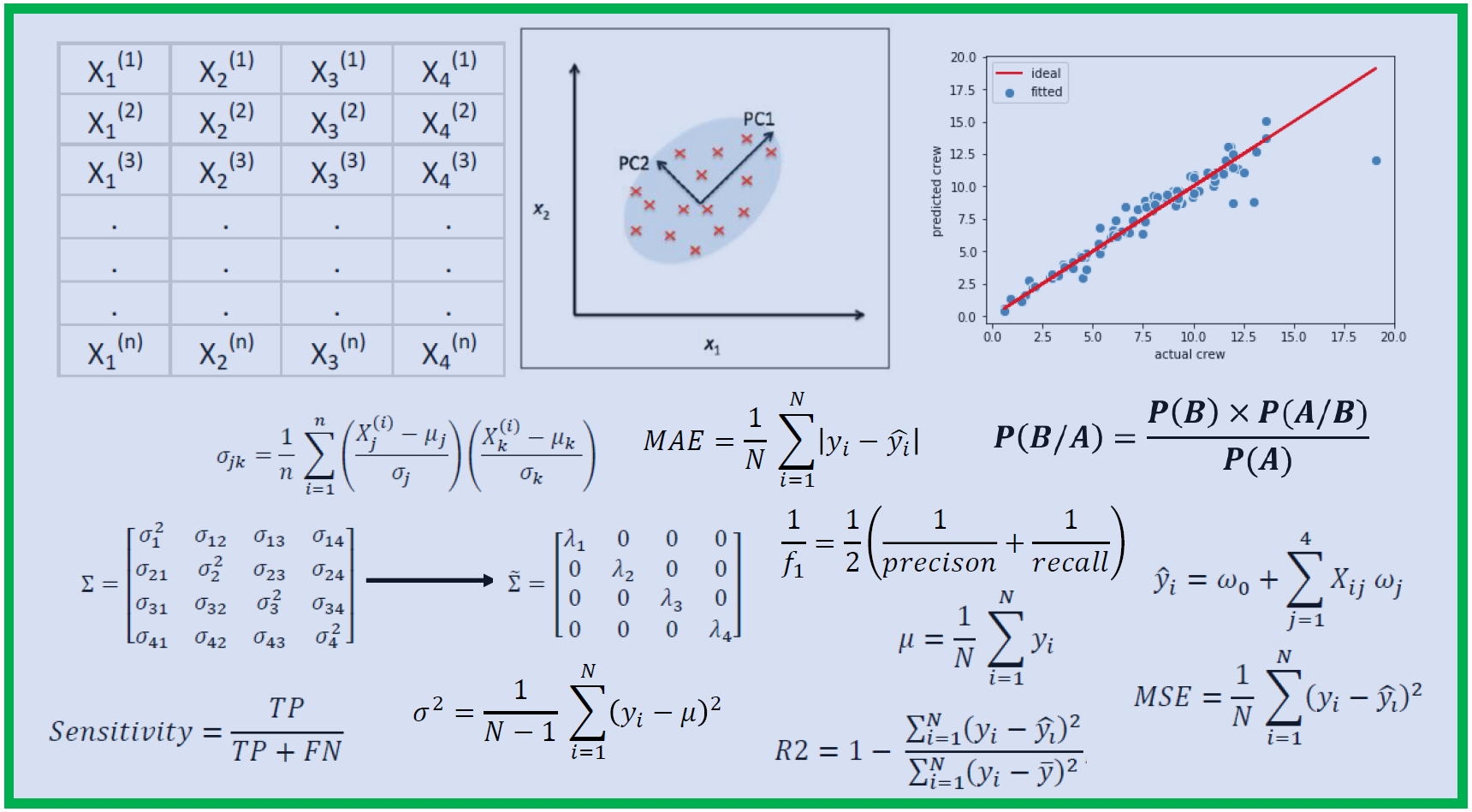Machine learning is crucial for data science, as it enhances data analysis and insights. Basic machine learning skills are becoming a standard requirement for data scientists.
Understanding and evaluating machine learning models is essential for success in the field. As businesses increasingly rely on data-driven decision-making, proficiency in machine learning is a valuable asset for data scientists. By leveraging machine learning techniques, data scientists can extract meaningful patterns and predictions from complex datasets, thereby driving innovation and informed strategies.
The integration of machine learning into data science practices empowers professionals to uncover hidden trends and correlations, enabling organizations to make strategic decisions based on data-driven insights.
The Role Of Machine Learning In Data Science
Machine learning is a crucial component of data science, with basic levels becoming a standard requirement for data scientists. The ability to evaluate machine learning is essential, as it enhances the gathering of information and aids in trend analysis, contributing significantly to the field of data science.
Machine Learning As A Tool
Machine learning is a vital tool for data scientists, as it enables them to build predictive models and extract insights from large, complex datasets. With machine learning, data scientists can create models that can learn from data and make predictions on new, unseen data. These models can be used to solve a range of business problems, such as fraud detection, customer segmentation, and predictive maintenance. However, it is important to note that machine learning is just one tool in the data scientist’s toolbox.
Beyond Data Science
Although machine learning is often associated with data science, it is used in a variety of fields beyond data science. For example, machine learning is used in natural language processing, computer vision, and robotics. In these fields, machine learning is used to develop systems that can understand and interact with the world in a more human-like way. This highlights the importance of machine learning as a skill that transcends data science and can be applied in a variety of contexts.
In conclusion, machine learning is an essential tool for data scientists, but it is not the only tool they need. Data scientists should also have a solid understanding of statistics, data visualization, and programming. Furthermore, machine learning is a skill that goes beyond data science and can be applied in a variety of fields. Therefore, it is important for aspiring data scientists to develop a strong foundation in machine learning, while also gaining a broad set of skills that enable them to tackle a range of business problems.
Machine Learning Proficiency For Data Scientists
Machine learning proficiency is becoming increasingly essential for data scientists as the demand for advanced data analysis and predictive modeling continues to rise. Data scientists are expected to possess a strong foundation in machine learning techniques to effectively uncover insights and patterns from complex datasets.
Essential Skills And Evaluation
Data scientists should have a thorough understanding of essential machine learning concepts such as regression, classification, clustering, and dimensionality reduction. Proficiency in programming languages like Python and R is crucial for implementing machine learning algorithms and performing data analysis.
- Data scientists require a strong foundation in essential machine learning concepts.
- Proficiency in Python and R is crucial for implementing machine learning algorithms.
Standard Requirements
Standard requirements for machine learning proficiency in data science include the ability to evaluate and fine-tune machine learning models to ensure optimal performance. Data scientists need to be adept at assessing model accuracy, precision, recall, and other performance metrics to make informed decisions about model selection and deployment.
- Data scientists must be able to evaluate and fine-tune machine learning models.
- Adeptness in assessing model accuracy, precision, and recall is crucial for making informed decisions.
To maximize effectiveness in machine learning, a strong foundation in programming languages like Python is essential. For those keen on enhancing these skills, exploring tailored Python courses can be invaluable. Such courses provide specialized training tailored to different levels of expertise, ensuring a fit for all aspiring data scientists. This pathway ensures comprehensive understanding and hands-on application necessary for data analysis within complex datasets.
Machine Learning Vs. Data Analysis
Machine learning and data analysis are integral components of data science, each serving a unique purpose in extracting insights from data. While machine learning focuses on creating algorithms that can learn from and make predictions or decisions based on data, data analysis involves inspecting, cleaning, and transforming data to draw conclusions and make decisions.
Business Context And Data Needs
In the business context, the decision to employ machine learning techniques for data analysis hinges on the specific data needs of an organization. It is crucial to understand the nature of the data, the existing analytical gaps, and the potential for leveraging machine learning to derive actionable insights. The strategic application of machine learning requires aligning it with the business goals and data requirements.
Strategic Application Of Ml
Strategic application of machine learning involves identifying opportunities where machine learning can provide a competitive advantage. This includes leveraging machine learning to address analytical gaps with high business value and implementing models to enhance decision-making processes. Additionally, it involves integrating machine learning into the organizational workflow to optimize operations and enable data-driven strategies.

Credit: towardsai.net
Learning Curve For Machine Learning In Data Science
Machine learning is an essential tool for data scientists, but the level of expertise required depends on the specific job and industry. However, having a basic understanding of machine learning and the ability to evaluate its effectiveness is becoming increasingly important for data scientists.
Ultimately, the extent to which machine learning is needed for data science varies depending on the specific business context and analytical gaps that need to be addressed.
When it comes to data science, understanding the learning curve for machine learning is crucial. Aspiring data scientists often wonder about the amount of machine learning knowledge they need to acquire to excel in their field. Let’s delve into the specifics of the learning curve for machine learning in data science.
Time Investment For Proficiency
Learning machine learning for data science requires a significant time investment. It’s essential to dedicate time to mastering the core concepts and techniques. This includes understanding various algorithms, model evaluation, and practical application in data analysis.
Core Python Libraries
Proficiency in core Python libraries is vital for leveraging machine learning in data science. The key libraries such as NumPy, Pandas, and SciPy play a pivotal role in data analysis and model development. Having a strong grasp of these libraries is fundamental for implementing machine learning algorithms effectively.
The Necessity Of Machine Learning For Data Analysts
Machine learning plays a crucial role in the field of data analysis, offering valuable insights and predictions. As data analysts, understanding the necessity of machine learning is essential for enhancing analytical capabilities and driving business value.
Analytical Gaps And Business Value
Identifying analytical gaps and leveraging machine learning to address them is vital for data analysts. By recognizing areas where traditional analytical methods fall short, analysts can harness machine learning algorithms to uncover patterns and trends that might otherwise remain undiscovered. This approach enables data analysts to provide actionable insights that directly contribute to the bottom line, thereby maximizing the business value of their analytical efforts.
Realistic Analytics Expectations
Setting realistic expectations for the role of machine learning in data analysis is imperative. While machine learning offers powerful tools for uncovering complex relationships within data, it is essential to approach its implementation with a clear understanding of its capabilities and limitations. By aligning expectations with the realistic potential of machine learning, data analysts can effectively leverage its capabilities to drive informed decision-making and strategic insights.
The Interplay Between Machine Learning And Data Science Careers
The Interplay Between Machine Learning and Data Science Careers
Data Science As A Pathway
Data science is an evolving field that encompasses a range of skills and expertise, including statistical analysis, programming, and domain knowledge. Aspiring data scientists often begin their journey by mastering the fundamentals of data manipulation, visualization, and statistical analysis. They then progress to learning machine learning algorithms, deep learning techniques, and big data technologies. Continuous learning and adaptation are key to thriving in this dynamic field.
Career Progression And Skillsets
As professionals gain experience in data science, they may choose to specialize in areas such as machine learning, natural language processing, or computer vision. Developing proficiency in advanced machine learning techniques, such as neural networks and ensemble methods, can open up opportunities for more specialized roles and higher-level responsibilities. Additionally, a solid foundation in programming languages like Python and R, along with expertise in data manipulation tools and cloud computing platforms, is essential for career advancement.
Frequently Asked Questions
How Much Machine Learning Is Needed For A Data Scientist?
Data scientists need basic machine learning skills as it’s becoming a standard requirement. They should evaluate machine learning effectively.
Do You Need Machine Learning For Data Science?
Machine learning is essential for data science as it enhances data analysis and trend forecasting.
How Much Ml Is Required For A Data Analyst?
A data analyst typically needs a basic level of machine learning skills for data analysis tasks.
How Much Python Is Required For Data Science?
Python proficiency for data science can be achieved in about six months, with mastery taking years. Fundamental skills are crucial for roles like Data Scientist, Data Engineer, and Business Analyst. Key Python libraries for data analysis include NumPy, Pandas, and SciPy.
Is Machine Learning Essential For Data Science?
Machine learning is crucial for data scientists to analyze and interpret complex datasets effectively.
Conclusion
Mastering basic machine learning is crucial for aspiring data scientists. Understanding the importance of evaluating machine learning models is a valuable skill in the field. As the demand for data science skills grows, a solid foundation in machine learning will be essential for success.












































Leave a Reply